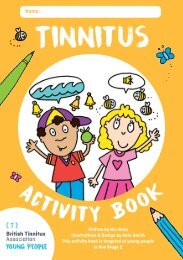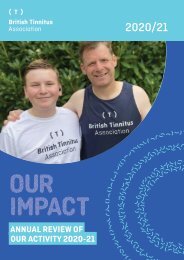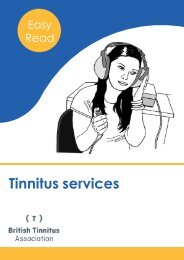Mindfulness for tinnitus Ver 2.1
You also want an ePaper? Increase the reach of your titles
YUMPU automatically turns print PDFs into web optimized ePapers that Google loves.
How can mindfulness help<br />
<strong>tinnitus</strong>?<br />
“I find I am more accepting of my <strong>tinnitus</strong> and so it is<br />
less intrusive. I can live with it more easily”<br />
<strong>Mindfulness</strong> does not aim to ‘fix’ <strong>tinnitus</strong> or make it go<br />
away, but rather make it less intrusive, to a point where<br />
it is no longer a problem <strong>for</strong> people. It teaches one how<br />
to live alongside difficulties such as <strong>tinnitus</strong>, without<br />
having to fight or change it. Practising mindfulness<br />
meditation can cultivate a more helpful way of<br />
responding to <strong>tinnitus</strong>, by encouraging gentle interest,<br />
curiosity, non-judgement and even acceptance, rather<br />
than ‘fighting it’ or ‘pushing it away’. <strong>Mindfulness</strong> does<br />
not aim to change the nature or sound of the <strong>tinnitus</strong>,<br />
instead, it can help us come to a better relationship<br />
with it, and this can aid habituation.<br />
It can be difficult to change how we react to something<br />
like <strong>tinnitus</strong>, so mindfulness therapy <strong>for</strong> <strong>tinnitus</strong> begins<br />
slowly. In treatment, we begin by learning how to pay<br />
mindful attention to other aspects of our daily life,<br />
such as eating, the sensations in parts of the body<br />
or feeling the physical sensations of the breath. This<br />
is done in a group, alongside other people who also<br />
struggle with <strong>tinnitus</strong>, and who are probably new<br />
to mindfulness. We go through simple meditations<br />
together and you also practice these at home. Regular<br />
home practice is important as it helps you to become<br />
more familiar with the technique and discover what<br />
mindfulness is really about.<br />
Later on in the group, it is possible to begin to spend<br />
brief moments deliberately paying mindful attention<br />
to sound and <strong>tinnitus</strong>. Understandably, this can lead<br />
to some anxiety, and the group offers a way to test out<br />
these fears, and in a way that allows you to feel safe.<br />
By ‘turning towards’ the sounds, with an attitude of<br />
calmly and gently allowing people may find that the<br />
sounds do not appear as threatening as expected.<br />
Research also shows that people who learn to become<br />
more able to ‘allow’ <strong>tinnitus</strong> will find it less distressing<br />
over time.<br />
difficult experiences generally, including <strong>tinnitus</strong>.<br />
Many people describe negative thoughts about<br />
<strong>tinnitus</strong> (the losses it has led to, and the fears of what<br />
will happen in the future). These negative thoughts<br />
can cause powerful emotional responses such<br />
as anxiety, anger or sadness, and keep the mind<br />
fixated on the <strong>tinnitus</strong>, preventing habituation. By<br />
becoming more aware through mindfulness practice,<br />
we learn to ‘recognise’ these thoughts. We can also<br />
recognise how they can spiral into familiar patterns of<br />
emotions and behaviours. The insight gained through<br />
meditation can allow us to choose how to respond<br />
these negative thoughts so that they are less likely to<br />
lead automatically to painful emotions and unhelpful<br />
behaviour.<br />
Our experiences with<br />
<strong>tinnitus</strong> and mindfulness<br />
Since 2010, we have been offering <strong>Mindfulness</strong> Based<br />
Cognitive Therapy (MBCT) to patients with chronic<br />
<strong>tinnitus</strong> attending the Royal National Throat Nose and<br />
Ear Hospital. Our treatment is based on the standard<br />
8-week MBCT course that is offered in other settings,<br />
however, we have adapted it <strong>for</strong> people with troubling<br />
<strong>tinnitus</strong>, and it is taught by clinical psychologists<br />
with expertise in working with <strong>tinnitus</strong> and other<br />
audiological conditions. Since this time, hundreds<br />
of patients have attended our groups and we have<br />
gathered strong evidence that this approach is of great<br />
benefit to them.<br />
In 2017 we published two papers that demonstrate<br />
that MBCT is an effective treatment <strong>for</strong> people with<br />
distressing <strong>tinnitus</strong>:<br />
A randomised controlled trial, funded by the British<br />
Tinnitus Association, compared MBCT <strong>for</strong> <strong>tinnitus</strong><br />
to Relaxation Training. This study clearly showed<br />
that MBCT led to significant reductions in the<br />
distress caused by <strong>tinnitus</strong> than Relaxation. These<br />
improvements lasted <strong>for</strong> longer and got even better<br />
in the six months following treatment. It also led to<br />
reduced levels of emotional distress and disability.<br />
This practice also reveals our habitual responses to<br />
Whilst the BTA makes every attempt to ensure the accuracy and reliability of this in<strong>for</strong>mation,<br />
it is not a substitute <strong>for</strong> medical advice. You should always see your GP/medical professional.


















